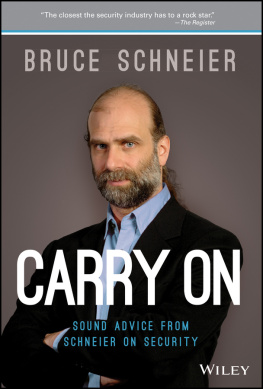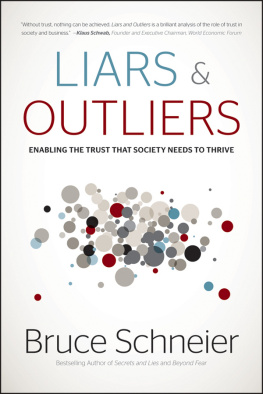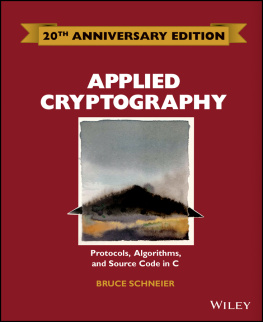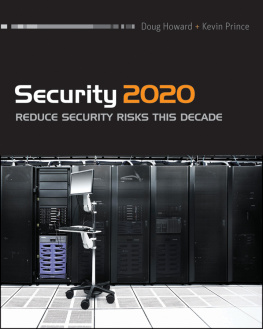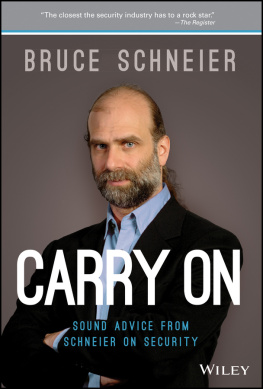Schneier - Carry on: sound advice from schneier on security
Here you can read online Schneier - Carry on: sound advice from schneier on security full text of the book (entire story) in english for free. Download pdf and epub, get meaning, cover and reviews about this ebook. City: Indianapolis, Indiana, year: 2014, publisher: Wiley, genre: Politics. Description of the work, (preface) as well as reviews are available. Best literature library LitArk.com created for fans of good reading and offers a wide selection of genres:
Romance novel
Science fiction
Adventure
Detective
Science
History
Home and family
Prose
Art
Politics
Computer
Non-fiction
Religion
Business
Children
Humor
Choose a favorite category and find really read worthwhile books. Enjoy immersion in the world of imagination, feel the emotions of the characters or learn something new for yourself, make an fascinating discovery.
Carry on: sound advice from schneier on security: summary, description and annotation
We offer to read an annotation, description, summary or preface (depends on what the author of the book "Carry on: sound advice from schneier on security" wrote himself). If you haven't found the necessary information about the book — write in the comments, we will try to find it.
Carry on: sound advice from schneier on security — read online for free the complete book (whole text) full work
Below is the text of the book, divided by pages. System saving the place of the last page read, allows you to conveniently read the book "Carry on: sound advice from schneier on security" online for free, without having to search again every time where you left off. Put a bookmark, and you can go to the page where you finished reading at any time.
Font size:
Interval:
Bookmark:

Originally published in Information Security, March 2008
This essay appeared as the second half of a point/counterpoint with Marcus Ranum.
We know what we don't like about buying consolidated product suites: one great product and a bunch of mediocre ones. And we know what we don't like about buying best-of-breed: multiple vendors, multiple interfaces, and multiple products that don't work well together. The security industry has gone back and forth between the two, as a new generation of IT security professionals rediscovers the downsides of each solution.
The real problem is that neither solution really works, and we continually fool ourselves into believing whatever we don't have is better than what we have at the time. And the real solution is to buy results, not products.
Honestly, no one wants to buy IT security. People want to buy whatever they wantconnectivity, a Web presence, email, networked applications, whateverand they want it to be secure. That they're forced to spend money on IT security is an artifact of the youth of the computer industry. And sooner or later the need to buy security will disappear.
It will disappear because IT vendors are starting to realize they have to provide security as part of whatever they're selling. It will disappear because organizations are starting to buy services instead of products, and demanding security as part of those services. It will disappear because the security industry will disappear as a consumer category, and will instead market to the IT industry.
The critical driver here is outsourcing. Outsourcing is the ultimate consolidator, because the customer no longer cares about the details. If I buy my network services from a large IT infrastructure company, I don't care if it secures things by installing the hot new intrusion prevention systems, by configuring the routers and servers as to obviate the need for network-based security, or if it uses magic security dust given to it by elven kings. I just want a contract that specifies a level and quality of service, and my vendor can figure it out.
IT is infrastructure. Infrastructure is always outsourced. And the details of how the infrastructure works are left to the companies that provide it.
This is the future of IT, and when that happens we're going to start to see a type of consolidation we haven't seen before. Instead of large security companies gobbling up small security companies, both large and small security companies will be gobbled up by non-security companies. It's already starting to happen. In 2006, IBM bought ISS. The same year BT bought my company, Counterpane, and last year it bought INS. These aren't large security companies buying small security companies; these are non-security companies buying large and small security companies.
If I were Symantec and McAfee, I would be preparing myself for a buyer.
This is good consolidation. Instead of having to choose between a single product suite that isn't very good or a best-of-breed set of products that don't work well together, we can ignore the issue completely. We can just find an infrastructure provider that will figure it out and make it workwho cares how?
Originally published in Wired News, April 17, 2008
Last week was the RSA Conference, easily the largest information security conference in the world. More than 17,000 people descended on San Francisco's Moscone Center to hear some of the more than 250 talks, attend I-didn't-try-to-count parties, and try to evade over 350 exhibitors vying to sell them stuff.
Talk to the exhibitors, though, and the most common complaint is that the attendees aren't buying.
It's not the quality of the wares. The show floor is filled with new security products, new technologies, and new ideas. Many of these are products that will make the attendees' companies more secure in all sorts of different ways. The problem is that most of the people attending the RSA Conference can't understand what the products do or why they should buy them. So they don't.
I spoke with one person whose trip was paid for by a smallish security firm. He was one of the company's first customers, and the company was proud to parade him in front of the press. I asked him whether he walked through the show floor, looking at the company's competitors to see if there was any benefit to switching.
I can't figure out what any of those companies do, he replied.
I believe him. The booths are filled with broad product claims, meaningless security platitudes and unintelligible marketing literature. You could walk into a booth, listen to a five-minute sales pitch by a marketing type, and still not know what the company does. Even seasoned security professionals are confused.
Commerce requires a meeting of the minds between buyer and seller, and it's just not happening. The sellers can't explain what they're selling to the buyers, and the buyers don't buy because they don't understand what the sellers are selling. There's a mismatch between the two; they're so far apart that they're barely speaking the same language.
This is a bad thing in the near termsome good companies will go bankrupt and some good security technologies won't get deployedbut it's a good thing in the long run. It demonstrates that the computer industry is maturing: IT is getting complicated and subtle, and users are starting to treat it like infrastructure.
For a while now I have predicted the death of the security industry. Not the death of information security as a vital requirement, of course, but the death of the end-user security industry that gathers at the RSA Conference. When something becomes infrastructurepower, water, cleaning service, tax preparationcustomers care less about details and more about results. Technological innovations become something the infrastructure providers pay attention to, and they package it for their customers.
No one wants to buy security. They want to buy something truly usefuldatabase management systems, Web 2.0 collaboration tools, a company-wide networkand they want it to be secure. They don't want to have to become IT security experts. They don't want to have to go to the RSA Conference. This is the future of IT security.
You can see it in the large IT outsourcing contracts that companies are signingnot security outsourcing contracts, but more general IT contracts that include security. You can see it in the current wave of industry consolidation: not large security companies buying small security companies, but non-security companies buying security companies. And you can see it in the new popularity of software as a service: Customers want solutions; who cares about the details?
Imagine if the inventor of antilock brakesor any automobile safety or security featurehad to sell them directly to the consumer. It would be an uphill battle convincing the average driver that he needed to buy them; maybe that technology would have succeeded and maybe it wouldn't. But that's not what happens. Antilock brakes, airbags and that annoying sensor that beeps when you're backing up too close to another object are sold to automobile companies, and those companies bundle them together into cars that are sold to consumers. This doesn't mean that automobile safety isn't important, and often these new features are touted by the car manufacturers.
The RSA Conference won't die, of course. Security is too important for that. There will still be new technologies, new products and new startups. But it will become inward-facing, slowly turning into an industry conference. It'll be security companies selling to the companies who sell to corporate and home usersand will no longer be a 17,000-person user conference.
Next pageFont size:
Interval:
Bookmark:
Similar books «Carry on: sound advice from schneier on security»
Look at similar books to Carry on: sound advice from schneier on security. We have selected literature similar in name and meaning in the hope of providing readers with more options to find new, interesting, not yet read works.
Discussion, reviews of the book Carry on: sound advice from schneier on security and just readers' own opinions. Leave your comments, write what you think about the work, its meaning or the main characters. Specify what exactly you liked and what you didn't like, and why you think so.

